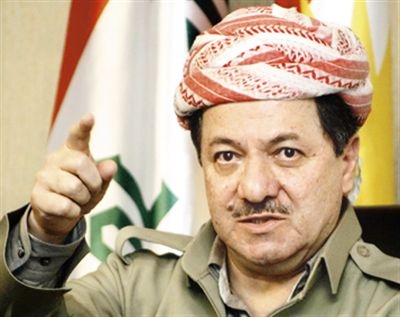President of Iraq’s Kurdistan Region, Massoud Barzani, rejected the announcement of the Kurdish Democratic Union Party (PYD) of the establishment of a transitional administration in the Kurdish-majority areas in northeastern Syria. Barzani accused the PYD of “cooperation with the Assad regime to implicate Syria’s Kurds in the ongoing war in Syria” adding that “the Kurds have been neutral since the beginning of the revolution and that they have been dedicating their efforts towards getting their national rights and democracy.” Furthermore, Mohamed Khair Banco, a member of the Kurdish National Council, considers the timing of PYD’s announcement as “ inappropriate and can be seen as backlash to the Kurdish National Council joining the Syrian Coalition.” Banco stressed that “the problem is not in the declaration of the transitional government, but the backlash of the Kurdish National Council joining under the umbrella of the Syrian Coalition.” Banco added that” the declaration of the PYD’s transitional administration is not intention to secede, but created for the purpose of filling the security and administrative vacuum experienced in the region.” The Syrian Coalition, however, viewed the PYD’s move as “separatist,” adding that this unilateral decision is completely detached from the aspirations of the Syrian people seeking to build a unified, independent state. The Syrian Coalition sees the PYD as “anti-revolution and a main supporter of the Assad regime.”
Barzani added that “the PYD tried by force, and through cooperation with the Assad regime, to impose its agenda, claiming that they stand behind the spark that ignited the revolution, but a revolution against whom?
The regime handed over those areas to them, and the PYD unilaterally ruled these areas had been abandoned by Assad, taking advantage of the Erbil Agreement and the support they get from the Assad regime. We see this is as a dangerous game for the future of our people there, because the PYD did not stop with seizing the areas northeast of Syria, but began to kill and arrest members of other parties.”
The Syrian Coalition described this move as “separatist” and said that it does not have any link to the aspirations of the Syrian people seeking to build a unified and independent state. The Syrian Coalition’s statement stressed that there are “links between the PYD and external agendas” and condemned “the PYD’s repeated repressive practices through its military wing and its attacks on the freedoms of Arab and Kurdish citizens over the past months.” The Syrian Coalition also rejected the “PYD’s resorting to the use of power in dealing with civilians, and fighting battalions and brigades of the Free Syrian Army.” The Syrian Coalition expressed dismay that the PYD “stopped fighting the regime on several fronts and moved to strengthen its positions within the liberated areas.”
Meanwhile, the U.S. Ambassador to Syria, Robert Ford, said that his country supports the unity of Syria, and that the Assad regime is the root of the problem in the injustice exerted on the Kurds in Syria, saying that “the Kurdish issues are constitutional issues and must be negotiated by all Syrians, and they cannot be solved through unilateral actions. Ford also expressed hope that the Kurds remember that “it is better to focus on the success of the revolution and the success of the moderates and then resolve the constitutional issues at a later time.” (Source: Syrian Coalition)













